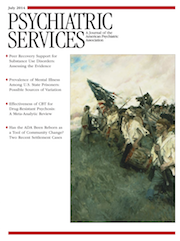Psychiatric Advance Directives in Traditional Health Systems
Psychiatric advance directives allow people with mental illnesses to state their mental health treatment preferences in advance of a psychiatric emergency when patients are unable to communicate their wishes. The directives facilitate mutual collaboration between consumer and provider even under the most stressful circumstances. The past ten years have seen mounting consumer demand, mental health advocacy, and public policy endorsement for psychiatric advance directives but limited implementation, particularly within general health care settings based on a traditional medical model.
To broaden implementation and to aid the development of recovery orientation within a behavioral health system, we introduced psychiatric advance directives at St. Luke’s–Roosevelt Hospital Center, a tertiary care teaching hospital in New York City. In its pilot phase, the project serves patients at highest risk of contact with emergency services.
The first hurdle, or challenge, in our process to institute a psychiatric advance directives program was to be sensitive to the nature and timing of decision making within corporate systems. We implemented the directives program over nine months in 2012–2013. The program was novel as well as a challenge to traditional paternalism, and launching it required collaboration of several units within the hospital, including the departmental chair’s office, the chief of psychiatric inpatient and emergency services, hospital legal counsel, and the software designer of our electronic health record (EHR). Although our project had its beginnings in 2008, a confluence of subsequent events created opportunity to bring the effort to fruition. Specifically, these were a persistent education of staff and administrators on recovery-oriented practice, the hiring of a peer specialist to advance this commitment, and the emergence of a Joint Commission standard requiring that these directives be honored and recommending that they be offered in behavioral health settings. Especially with enhanced regulatory incentive, administrators could justify resources for the project. Psychiatric advance directives were thus endorsed as a patient-authored tool to guide treatment and minimize coercive and adversarial situations during episodes of acute disabling illness.
The second hurdle was to develop a directives document that patients and clinicians considered straightforward and brief. We tailored a template used by the State of Florida. Gaining active collaboration with hospital counsel was indispensable in order to ensure that our directives form was consistent with state laws regarding advance directives.
The third hurdle concerned practical details of formulating psychiatric advance directives with patients. We used a facilitated directives model whereby patients delineate treatment preferences and optionally identify a mental health care advocate in collaboration with a facilitator who has no professional role in their care. Our facilitator is a peer specialist who educates patients that these directives are communication tools and expressions of self-efficacy. An introduction to psychiatric advance directives is integrated into Copeland’s Wellness Recovery Action Plan (WRAP) course. This group process provides opportunity for consumers to share concerns and discuss aspects of the directives; they also have an opportunity to become well acquainted with the peer specialist/facilitator. At WRAP termination, the facilitator schedules individual sessions with anyone who expresses interest in completing a directives document. During the initial pilot round, all six participants opted to compose a set of directives that ideally should be revised every 12 months.
An additional challenge encountered during this process was patients’ surprise by, and sometimes distrust of, the novelty of a heightened collaborative approach. One person chose not to have the completed directives scanned into the EHR but wished to rely on personally furnishing it to an emergency service; another ultimately addressed her provider directly to express dissatisfaction with and curiosity about a recent inpatient admission, fostering a more robust working relationship. Finally, another issue among some socially isolated patients was difficulty in finding someone available to be a mental health care advocate. This is one area where peer-run organizations could consider offering special “peer advocate” outreach to help close this gap, which could diminish disaffiliation among patients and bolster hope.
The fourth hurdle concerned access and enforceability: how to ensure that directives are accessed and honored by providers in emergencies. In New York State, psychiatric advance directives have legal status equal with a standard health care proxy. However, because psychiatric advance directives have yet to proliferate, we counseled patients that theirs could be guaranteed only at our own hospital, where the emergency department and inpatient services are supportive of the program. In our EHR, an “alert” that directives exist was programmed onto the opening page, cueing emergency staff to open the document. In the first four months after implementation of the program, one psychiatric advance directive has been accessed to guide the patient’s care in the psychiatric emergency department and inpatient service. A second round of the WRAP directives course is now under way with five new participants. We are optimistic that this program will fill a growing need for patients.



